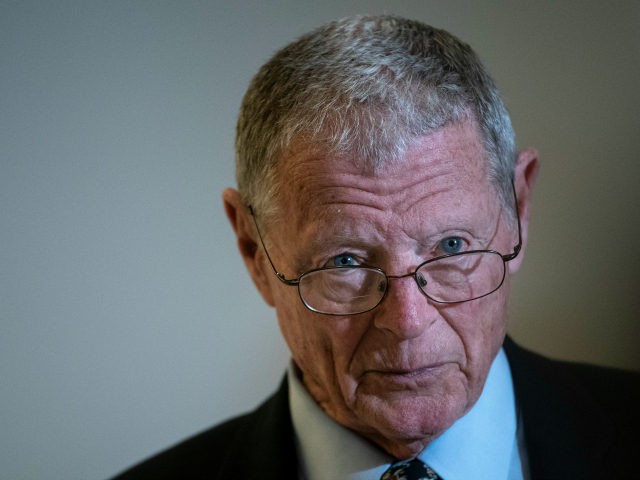Sen. Jim Inhofe (R-OK) will introduce legislation on Earth Day that would stop the Biden administration from enacting climate regulations until the top world’s polluters outside the United States, namely China, India, and Russia, adhere to the same regulatory standards as America.
Inhofe, the senior member of the Senate Committee on Environment and Public Works, believes his bill, dubbed the Domestic Manufacturing Protection Act, would ultimately prevent the Biden administration from hurting American jobs and businesses amid the ongoing coronavirus pandemic by recommitting the United States to the Paris Climate Agreement.
The Trump administration pulled out of the pact.
Specifically, Inhofe’s legislation would block Biden’s Environmental Protection Agency (EPA) from implementing any climate regulations until China, Russia, and India adhere to the same standards as the United States. The top four polluters in descending order are China, the United States, India, and Russia.
Inhofe noted:
The 2015 Paris Climate Agreement allowed the world’s biggest polluters a free pass while sacrificing American manufacturing jobs. That’s why I urged President Trump to pull out of the bad deal. Now, the Biden administration plans to not only recommit, but build upon this failed agreement. That’s why I am introducing the Domestic Manufacturing Protection Act, which holds China, India, and Russia to the same standard as the United States.
China and Russia are our greatest threats in national security and in economic competition. If we don’t want China to ‘eat our lunch’ as President Biden said, then we need to challenge them at every turn. Passing my Domestic Manufacturing Protection Act is a good step in that effort because we can’t risk a one-sided climate restriction that would give them a leg up on economic growth and trade.
Republicans believe Biden’s climate policies will kill jobs, something his own administration has conceded.
During a speech on what he described as the “climate crisis,” U.S. State Secretary Antony Blinken admitted this week some American workers “would be hit hard” by the Biden administration’s response to the “climate crisis.”
However, he added, “We won’t leave those Americans behind. We’ll provide our fellow Americans with pathways to new, sustainable livelihoods, and support as they navigate this transition.”
President Joe Biden has already imposed unilateral restrictions on the United States the senator warns will tip the playing field against American workers and manufacturers.
This week, the Biden Administration pledged to reduce U.S. emissions by 50 percent reduction by 2030, an ambitious target.
Experts at the Heritage Foundation predicted the Paris Climate Agreement target of an estimated 30 percent would cost the United States 400,000 jobs annually, suggesting that a higher goal would decimate the American job market even more.
Despite an Obama administration assessment determining that it was not an environmental threat, President Biden canceled the Keystone XL pipeline on his first day in office.
The Democrat president also froze oil and gas leasing on federal lands. His actions resulted in over 1,000 layoffs and prevented the creation of an estimated 70,000 new jobs.
China, the top greenhouse gas emitter in the world and the second-largest economy after the United States, is not committed to combating the “climate crisis.”
“Some countries are asking China to do more on climate change,” Le Yucheng, China’s deputy foreign minister, said last week. “I am afraid this is not very realistic.”
Still, “China welcomes the U.S. return to the Paris agreement and expects the U.S. side to uphold the agreement,” Chinese Vide Premier Han Zheng added.
Fighting climate change without Beijing on board would give China a significant advantage to become the world’s top economy.
Russia and India also do not appear interested in meeting any emissions reduction targets. India increased its emission in 2019 despite pledging to bring them down by one-third over the next decade.
Meanwhile, Russia is woefully “inadequate” in meeting its commitment.
Biden has invited 40 world leaders to Washington this week for a virtual Eart Day summit on climate. Blinken admitted conceded if America tackles climate change alone, it “won’t be enough” to solve the “crisis.”
“Even if the United States gets to net zero emissions tomorrow, we’ll lose the fight against climate change if we can’t address the more than 85 percent of emissions coming from the rest of the world,” he acknowledged.
Some experts noted that even if China joins the U.S., it will not be enough.

COMMENTS
Please let us know if you're having issues with commenting.